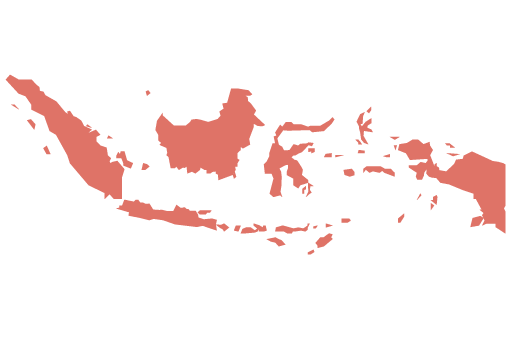Overview
2020 Index score: 66.7
2015 Index score: 64.9
Status: ‘Some progress’ since 2015 and ‘poor’ overall score
2020 Global ranking: 76 of 144 countries
2020 Regional ranking: 15 of 26 countries in Asia and the Pacific
Indonesia’s overall score of 66.7 in the SDG Gender Index in 2020 reflects ’some progress’ in its score since 2015. Its top scores in 2020 are for Sustainable Development Goal (SDG) 6 on water, SDG 7 on clean energy and SDG 3 on health. While the legal age of marriage has been changed and the world’s largest national health insurance programme has been put in place, implementation challenges and harmful gender norms stifle progress.
Indonesia has made ‘fast progress’ on several goals since 2015. Its score for SDG 13 on climate has increased by almost 14 points, placing the country 35th globally. Indonesia has also seen an impressive 12-point increase on SDG 9 on innovation – due to women’s greater use of digital banking (Ind. 9.1) and their wider access to the internet (Ind. 9.3) – plus improvements of 6 points or more on SDG 6 on water, SDG 8 on work and SDG 7 on clean energy.
Indonesia has performed very well on reducing the number of over-age girls in primary education (Ind. 4.1). However, it scores ‘very poor’ on women attaining at least some secondary education (Ind. 4.4) and on girls’ expected years of schooling (Ind. 4.2). As such, the overall score for SDG 4 on education has improved only slightly from 67 in 2015 to 69 in 2020.
Indonesia’s lowest scores are for SDG 17 on partnerships, SDG 10 on inequalities and, of great concern, SDG 5 on gender equality, on which the country now ranks 115th globally. Improvement in the share of women in parliament (Ind. 5.4) has been counterbalanced by declines in women in ministerial roles (Ind. 5.5). Indonesia also has a ‘very poor’ and unchanged score of just 15 points on legal grounds for abortion (Ind. 5.3).
The largest decline has been on SDG 11 on sustainable cities, falling 12 points since 2015 and driven by women’s changing perceptions of housing costs (Ind. 11.1), higher CO2 emissions (Ind. 11.2) and more people living in slums (Ind. 11.4). With 56.6 per cent of people living in cities – and Jakarta among the largest in the world – this decline is particularly concerning.

Important message
Indonesia’s overall score reflects some progress towards gender equality.

Reflections from KAPAL Perempuan
Indonesia’s performance in the 2022 SDG Gender Index shows the need for more political will and coordinated effort to fulfil girls’ and women’s rights. While Indonesia has seen a 12-point increase in the Index between 2015 and 2020 on SDG 9 on innovation – due to advancements in women’s use of digital banking (Ind. 9.1) and their internet access (Ind. 9.3) – there remain significant inequalities, especially amongst women in remote areas with limited communication tools, internet coverage and electricity.
The Index also shows an increase of 7.5 points on SDG 8 on work. Although there has been ‘fast progress’ on women’s economic empowerment in the formal sector, informal workers (mostly women) still do not have the same rights and protections. For example, domestic workers are not entitled to decent wages, social security or a secure working environment, and are frequently victims of violence. In 2019, most of those employed in Indonesia worked in the informal sector, and 61 per cent of informal workers were women in both rural and urban areas. Gender and labour advocates have been pushing for the Domestic Workers’ Bill to be enacted since 2004, with no concrete results from the government and parliament.
Worryingly, Indonesia scores lowest on SDG 5 on gender equality, with just 51 points (‘very poor’). This is far below the regional average, even though Indonesia already has legal protection for women and children, regulations on gender mainstreaming, and a gender-responsive development budget. In 2019, Indonesia revised its Marriage Act by adjusting the minimum age for marriage for girls from 16 to 19 years, though implementation challenges remain. This is indicative of an environment where changes in legal and policy frameworks may not necessarily translate into real change – more women leading policy implementation may help address these gaps.
Such challenges might be explained by the prevailing social norms of patriarchy and women’s subordination in the name of religious teachings and customs. Violence against women continues to increase, including sexual violence which is pervasive. Data from the Indonesian National Committee of Women show that of 431,471 reported cases of violence against women, 25 per cent (2,807) involved sexual violence. The 2016 National Women’s Life Experience Survey revealed that 41.7 per cent of surveyed women experienced violence, including sexual violence. It is urgent that the Indonesian government enact the Sexual Violence Crime Bill to protect survivors of violence and their families.

